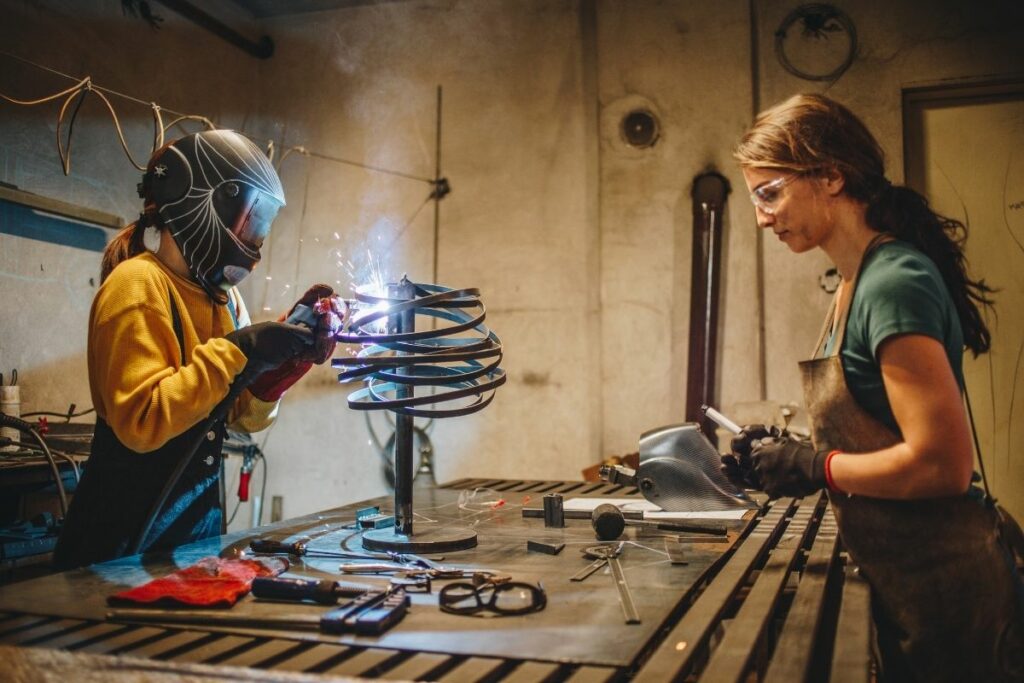
Even though welding is not entirely an unfamiliar job and is in fact highly in-demand, people still have a ton of misconceptions about it. It can only be assumed that future welders could have started sooner in pursuing their studies or even a profession in this lane if only there weren’t many stereotypes surrounding it.
This article aims to debunk some stereotypes and myths that people might still believe and to encourage aspiring welders pursue a profession in welding.
Welding, being a job that highly requires manual and physical work, creates a strong impression that it can only be done by men. However, it is not true that this trade is simply a man’s world. Welding has nothing to do with gender as it requires strength, coordination, and craftsmanship which women are perfectly able to pull off, too. For example, the U.S. Bureau of Labor Statistics reports that women make up 3.8% of welding, soldering, and brazing in 2020. It’s not exactly a high percentage but it goes to show that it’s not unheard of.
This myth will potentially be obsolete especially in modern times which tend to be more inclusive than ever when it comes to equality rights in the workplace. Thus, both sexes can equally deliver on the task, and to deliver it well.
It is correct that construction workers can and do weld, but they are not welders per se. Constructions workers are more inclined to work involving physical infrastructures and they do on-site tasks. Welders, on the other hand, are the ones responsible for various operations involving welding, such as shipyards, nuclear power plants, and the creation of automobiles, and space crafts, to name a few. Simply put, welders contribute to the formation of all things metal.
It might be true that generally, welding indoors, like in basements, can pose threats and danger. But it is not a hard-fast rule that welding can only be done outdoors. Welders usually choose to weld outdoors because of the spacious area, good weather, and convenience to get supplies and equipment. Nevertheless, if confined spaces are properly ventilated and you have safety equipment in place, then one can certainly and safely weld.
Since welding consists of several types and forms, some examples of metals that a welder can weld indoors are steel, brass, and aluminum. Furthermore, gas metal arc welding and stick welding are among those that can be done at home.
Many have this misconception that anybody can be a welder even with just a high school diploma or that welders are not necessarily formally-educated. Although some were able to get into the line of work without having a degree, especially in the old times, it is important to note that times have also changed. Welding has now become a competitive profession that requires highly skilled individuals. Welding schools now transform and upgrade the quality of their education, adapting to the ever changing needs that the times bring. At present, the labour market can be cutthroat where skilled or specialised welders are required to have certain certifications before being qualified to pick up a job in this profession.
When you visualise welding, you usually see rust, oil, grease, cluttered materials, and splattered paint all over the place—all of which generally appear to be dirty. However, welding is not always messy and chaotic. Much of the dust and flux can easily be cleaned.
Today, there are more manual and semi-automatic welding. For example, with an automated welding machine, a welder can either just operate the machine or monitor the entire process. This method is often utilised for welding that involves large-scale operations like cars.
Once we slowly unlearn these kinds of stereotypes and believed myths, we become more open and considerate of this line of work to venture in. There are many opportunities in varied industries like automotive, energy, oil and gas, and industrial which include worthwhile salaries. Welding will always be needed and will remain an essential component in the work industry.